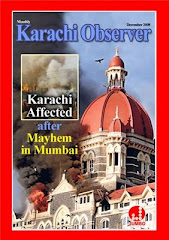
Gujarat Chief Minister Narendra Singh Modi criticises ruling Congress for not taking action against any local group
NAGPUR: Indian Gujarat Chief Minister Narendra Singh Modi hinted on Sunday that the Mumbai terror attacks could not have been carried out without internal help – comments that are in sharp contrast with claims by other Indian officials who hold Pakistan solely responsible for the attacks.
The senior Bharatiya Janata Party (BJP) leader said, “If we single out that one incident (Mumbai attacks) and ask any person in this country ... with basic information and knowledge, they will say that such a big terror attack on India cannot take place without any internal help from the nation itself.”
Criticism: He criticised the Congress-led coalition government for not taking action against any local groups involved in the Mumbai attacks.
Modi’s new theory contradicts India’s official position, and came just hours ahead of Pakistan’s reply to an Indian dossier of information given to Islamabad.
Addressing a BJP convention here, the Gujarat chief minister also slammed the policies of the ruling Congress party.
According to Hindustan times, Modi also made a scathing attack on the Gandhi-Nehru family, alleging that a conspiracy had been hatched to promote the family, posing a danger to the future of the country.
“A conspiracy to promote one family’s past is posing a danger for the future of the country,” Modi said without directly naming the Gandhi-Nehru family, but the indication was obvious.
NAGPUR: Indian Gujarat Chief Minister Narendra Singh Modi hinted on Sunday that the Mumbai terror attacks could not have been carried out without internal help – comments that are in sharp contrast with claims by other Indian officials who hold Pakistan solely responsible for the attacks.
The senior Bharatiya Janata Party (BJP) leader said, “If we single out that one incident (Mumbai attacks) and ask any person in this country ... with basic information and knowledge, they will say that such a big terror attack on India cannot take place without any internal help from the nation itself.”
Criticism: He criticised the Congress-led coalition government for not taking action against any local groups involved in the Mumbai attacks.
Modi’s new theory contradicts India’s official position, and came just hours ahead of Pakistan’s reply to an Indian dossier of information given to Islamabad.
Addressing a BJP convention here, the Gujarat chief minister also slammed the policies of the ruling Congress party.
According to Hindustan times, Modi also made a scathing attack on the Gandhi-Nehru family, alleging that a conspiracy had been hatched to promote the family, posing a danger to the future of the country.
“A conspiracy to promote one family’s past is posing a danger for the future of the country,” Modi said without directly naming the Gandhi-Nehru family, but the indication was obvious.
























